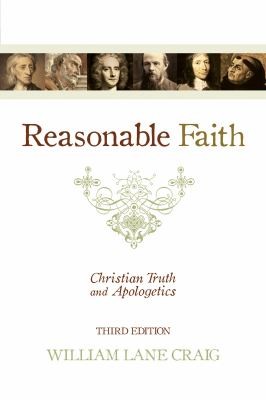William Lane Craig, Reasonable Faith
 William Lane Craig, Reasonable Faith: Christian Truth and Apologetics, third edition (Wheaton, IL: Crossway, 2008), 416 pages, ISBN 9781433501159.
William Lane Craig, Reasonable Faith: Christian Truth and Apologetics, third edition (Wheaton, IL: Crossway, 2008), 416 pages, ISBN 9781433501159.
A third edition of what has become something a classic work in the field of Christian apologetics since its original (1984) and second (1994) versions is well worth the reading (or re-reading). The author insists it has only expansions of content and minor updates rather than any retractions of arguments that didn’t stand up to the test of time. In a word, it still packs quite an intellectual punch. And no wonder. It is the signature book of a very prolific scholar and writer. William Lane Craig is research professor of philosophy at Talbot School of Theology (La Mirada, California) and founder of Reasonable Faith (www.reasonablefaith.org), a web-based apologetics ministry. He has been publically debating with detractors, including the infamous former (subsequently) atheist, Anthony Flew, and defending a Christian worldview against all comers for more than twenty years. He’s especially noted for his unique take on the cosmological argument for God’s existence and also for his philosophy of time and criticisms of the Jesus Seminar movement and postmodernism. He’s authored more than twenty books, about half of which are scholarly in nature with the other half aimed at a more popular audience.
Craig freely admits that Reasonable Faith represents his personal approach to Christian apologetics. Accordingly, he recommends other, supplemental, texts on the history and development of apologetics for readers desiring a well-rounded understanding. Craig understands apologetics (Greek, apologia) to be “that branch of Christian theology which seeks to provide a rational justification for the truth claims of the Christian faith.” Accordingly, apologetics is primarily a theoretical discipline. However, this is not a concession that apologetics is of no practical benefit. Christian apologetics has a major role in shaping culture, strengthening believers, and evangelizing unbelievers. While he distinguishes between offensive or positive and defensive or negative types of apologetics, and affirms the validity of both, he explains that Reasonable Faith is more in the offensive or positive mode. That is, it seeks to present a positive case for Christian truth claims rather than to nullify objections to them.
It is refreshing in a book on apologetics that there is such an energetic emphasis on the effective agency of the Holy Spirit.
Category: In Depth, Pneuma Review, Summer 2012


